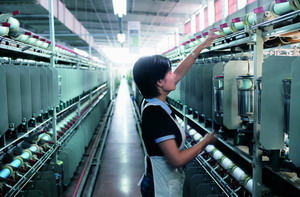Guidelines issued to promote China's logistics industry
Updated: 2011-08-20 10:46
(Xinhua)
|
|||||||||||
The State Council, or China's Cabinet, on Friday issued new guidelines to promote the healthy development of the country's logistics industry.
China will reduce tax burdens on logistics enterprises, give further favorable land policies for them, and promote convenient transport of logistics vehicles, according to a statement posted on the central government's website.
The country also vowed to accelerate reform in the logistics management system, reallocate logistics resources, push forward the innovation and application of logistics technologies, and invest more in the sector.
Farm produce logistics will be given priority, and government departments will improve coordination to accelerate the development of the country's logistics sector, the statement said.
In recent years, China's logistics industry has been experiencing consistent growth on the back of fast economic progress and a manufacturing-centered economy.
The emergence of a domestic market, rising demand for industrial and consumer goods and a large geographical spread have also resulted in the development of logistics services.
Last year, the industry's value-added reported a net increase of 700 billion yuan ($109.38 billion) from 2008, He Liming, chairman of China Federation of Logistics and Purchasing, said in an exclusive interview with Xinhua.
However, he noted that current policies lagged behind the actual needs of the industry, which restricted further development of the sector.
"It is a pressing need for the government to adopt new measures to boost the logistics industry," He said.
He believes the guidelines offer new hope for the growth of the sector as the government put forward concrete measures to resolve long-term problems facing the industry.
Statistics showed that road tolls accounted for nearly one third of the operational costs of logistics enterprises, which not only weighed on the companies' profit margins but also reduced logistics efficiency.
The ratio of total logistics costs to a country's gross domestic product (GDP), which reflects the efficiency of the logistics industry, decreased 0.3 percentage points last year from 2008, according to He.
However, the efficiency of China's logistics industry has room for improvement. According to a report from the KPMG, a global accounting firm, China's ratio of logistics spending to GDP is well above the average level for developed countries, where it is typically lower than 10 percent, as inefficient operations and inadequate transportation capacity have troubled China's logistics development.
To tackle the problem, the country pledged to cut fees and road tolls by gradually eliminating tolls on secondary roads, reducing toll gates and restricting the number of toll ways, according to the guidelines.
Additionally, the country encouraged big logistics enterprises to consolidate the fragmented industry through mergers and acquisitions, while small- and medium-sized enterprises should consider forging alliances for common development, the guidelines said.
Local governments are required to invest more in the construction of logistics infrastructure and provide necessary capital support to key logistics companies.
The guidelines also stressed the importance of the innovation of logistics technologies.
"The issuance of the guidelines showed the government's determination to boost the logistics sector. I believe the industry will enjoy a better business environment in the future," He noted.













